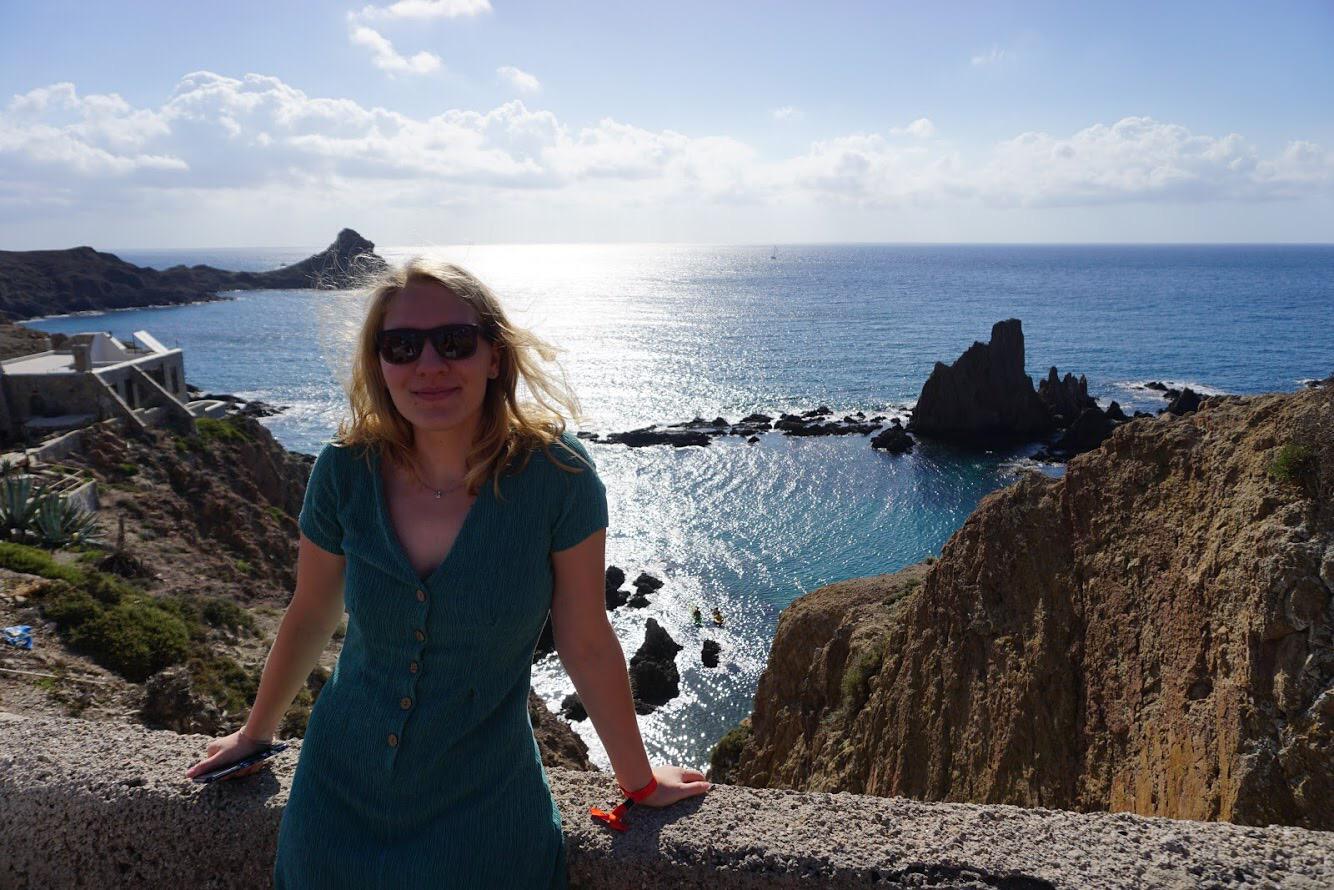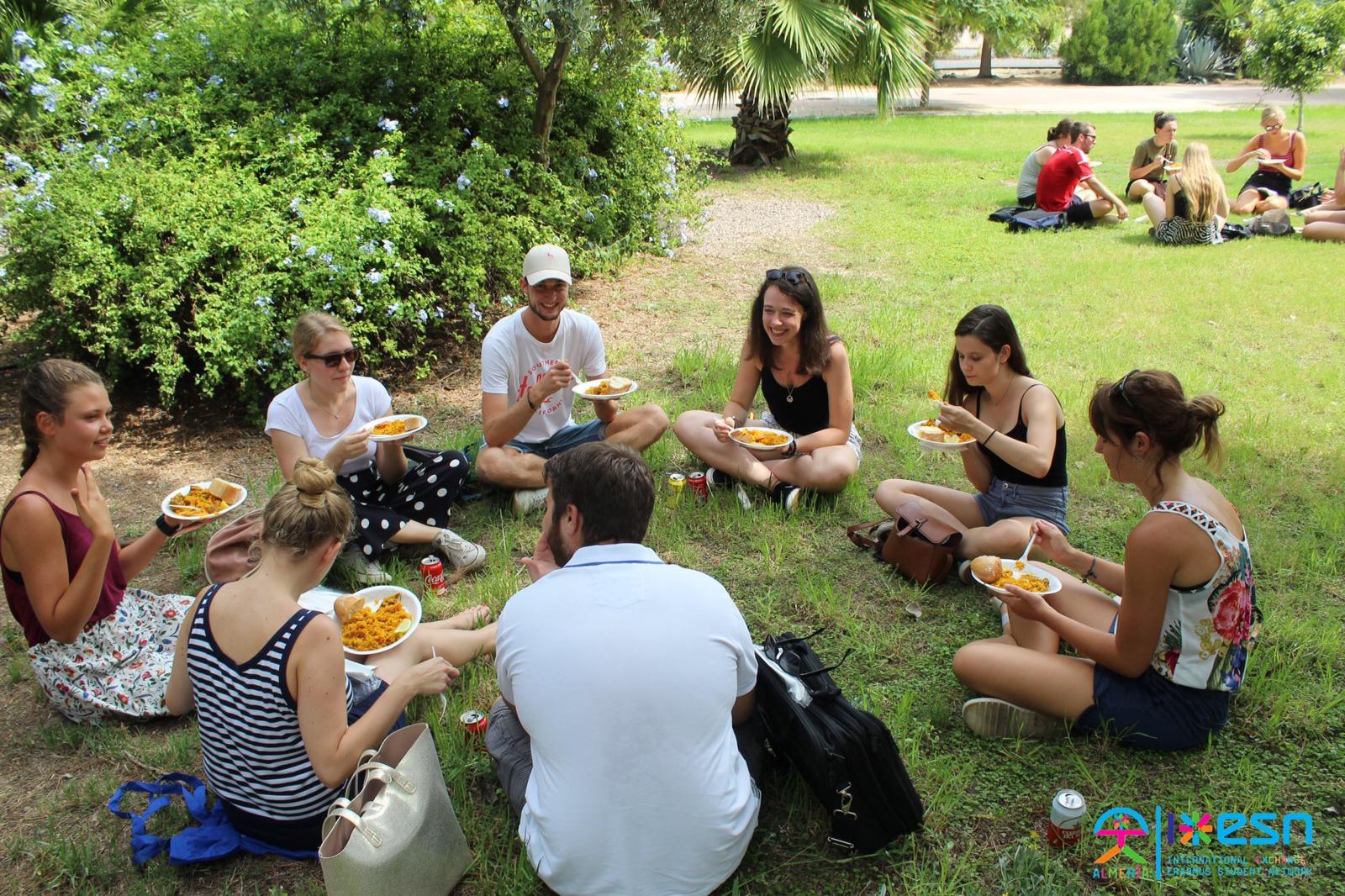|
Why did you decide to study abroad?
Because I wanted to learn the language better. I studied Spanish in school and university, but I thought it would be easiest to just go abroad and learn it in my day-to-day life.
Why did you choose Almería?
To be honest, first of all, because of its location directly at the sea. When I saw the pictures of the university I was really blown away. I also contacted students who had been to my universities’ (DHBW’s) partner universities in Spain before. The girl who studied in Almería the year before me finally convinced me to apply, because she told me what a wonderful time she had.
What did you expect from UAL that turned out to be different from reality?
I thought there would be some more courses in English. I had five courses and only one of them was taught in English. As I already explained, I knew some Spanish, but not nearly enough to take classes of macroeconomics or finance in that language (but I had to…). I needed to pass four of the five courses, in order to pass my semester in Germany. Accordingly, the grades I took home from Spain were not very good.
Other than that, my stay was great and fulfilled my expectations. You could always go to the ESN office and they helped you with all your questions. And it also helped that I lived in a flat with two Spanish-speaking girls, who were studying at UAL too. They helped me with finding out where I could get the macroeconomics script or how I could print at the university (both tasks that were very difficult for someone who only understood half of what was going on in class). Still, it was not easy for me to communicate in Spanish, because in Almería they speak a very different kind of Spanish than e.g. in Madrid. So, I had to understand the language (even though people from Almería seem to leave out the last half of a word when they’re talking) AND learn the vocabulary that comes with taking your normal classes in another language. This meant I had a very steep learning curve and once I was back in Germany, I could really see how much better I got at speaking Spanish.
Would you recommend other students to study abroad?
Of course, but I would also recommend to other students that they should come with more Spanish skills than I did. But other than that, I would definitely recommend it.
How much money did you get through your Erasmus+ grant? Was it enough?
I don’t remember what I got, but generally students who got Erasmus money also worked simultaneously. So, I would say it is not enough to “survive”, but it definitely covers the rent.
How hard were the classes? Was it difficult to pass? Which were your favorite/least favorite classes/professors?
The English class was easiest for me to pass, because my English was already good when I came to Spain. So, with this class I only had to learn the material and didn’t struggle with the language also. This was also my favorite class (Direction and Management Skills by Raquel Antolín López), as I really enjoyed the working classes.
In the Spanish classes, it really depended on the class and the professor, so, I did pass all my exams, but I didn't pass them very well with my limited knowledge of Spanish. It would have probably been easier if I had understood everything I was answering…
EU Economics was really hard because we had to give in papers every two weeks. And in order to do the homework, you had to read approx. 40 pages of material in Spanish every week, so that was quite problematic for me.
I would say Advanced Financial Transactions was also a bit difficult. Mostly because of the language again: generally, there are some mathematical things that you learn in Spain, I suppose, but in Germany, you learn it in a different way and in a different notation. So, you just don't understand what they're talking about in class, even though you would probably be able to do it German.
If you could change something, what would you do differently before your study abroad experience?
I think I wouldn't do anything differently because I couldn't really have prepared for my Spanish classes.
But if you come from another country, you probably also have to mentally prepare for a cultural crash because for me as a German, it was very difficult sometimes. E.g. Spanish students I had to do projects with, weren't really focused on the deadline and getting things done ahead of time. So, often I had to do my work three hours before the deadline and that was really something I had to get used to. But I learned to be a bit more relaxed through that, so in the end I maybe even profited from it.
Was it hard to find accommodation? Any advice for future students?
I didn't think it was hard, but I was very lucky because I found my flat before I arrived. I just wrote to people on the typical Spanish flat-searching platforms. But the other students who arrived in Almería and didn't have accommodations before were very well supported by the ESN team. They also know a lot of people who own flats and can provide you with somewhere to live, so I think accommodation was not a problem for anyone.
What did you think of the atmosphere at your home university?
I really like the atmosphere at my university. It's not very big (in comparison with UAL) but it’s located between two major cities in Germany (Heidelberg and Mannheim), so I like its general location. And the professors are really good, so you can learn a lot there. It’s also important to mention that the university partners with a lot of companies, so getting an internship during your stay is much easier than at other universities.
Which places in your home city would you recommend?
First, I would recommend going to Mannheim to see the water tower or the university there because it looks very similar to the castle in Versailles with lots of windows. Manheim is unique because its streets are arranged like squares. And then, of course, Heidelberg is very beautiful, with a river going through it, its old town and the castle on top of the hill.
What would you recommend to do at your hometown?
You can always go get some coffee (better in Heidelberg) or go shopping (better in Mannheim). In the summer in Heidelberg you would probably sit on the grass next to the river, because that's where students go most of the time and they buy something to drink and to eat (they also do barbecue) beforehand and just sit and talk. Both cities also have universities of their own, so going out in the evening is also fun.
How do you think this experience has changed you?
As I said before, I'm a bit more relaxed now and my Spanish got better. I made many new friends from other countries, like Belgium, France, Italy and of course Spain. And we still write each other and visit each other, even years after our/my stay.
What would you recommend to UAL students preparing to spend one semester or year at your University (housing, fun things to do, traditions, etc.)?
The first thing that comes to mind is when I came to Spain, everything was cheaper. The other way around, everything will be more expensive when you come to Germany. When you go out in Spain and eat tapas, you don't even spend 10€, while in Germany we don’t really have tapas, so you automatically spend more when you go out and eat something. Accommodation is probably also more expensive.
I feel like the most important traditions in Germany are Christmas, celebrated on the 24th (we don't have the celebration on 6th of January). Then we have New Year's Eve on the 31st of December and we also celebrate Easter.
For more information on studying abroad at my university, students can always refer to this internet page: https://www.mannheim.dhbw.de/en/international/exchange-students/exchange-students. In 2012 our International Office also uploaded a video to introduce Mannheim and the DHBW to foreign exchange students: https://www.youtube.com/watch?v=s_yQe0QeP2E.
Are you currently employed? Do you think your time abroad (or, specifically in Almería) helped you find a job?
Yes, I finished my studies in September and got employed this October (2020). My semester abroad and the improvements of my Spanish definitely helped me stand out from other applicants.
|












